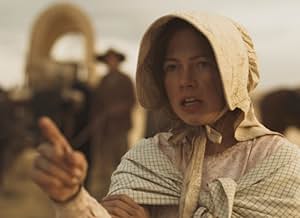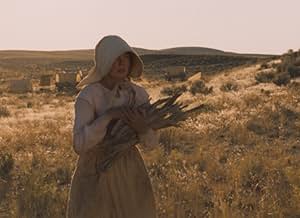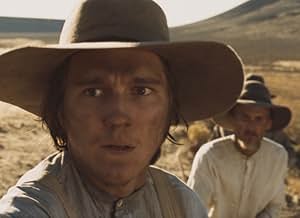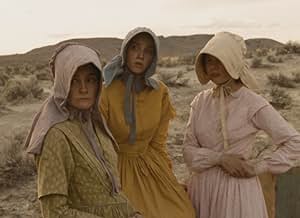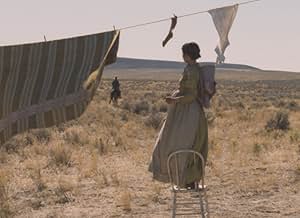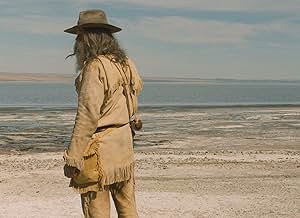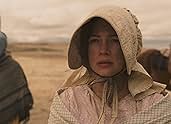NOTE IMDb
6,5/10
16 k
MA NOTE
Des colons voyageant à travers le désert d'Oregon en 1845 se retrouvent perdus dans des conditions extrêmes.Des colons voyageant à travers le désert d'Oregon en 1845 se retrouvent perdus dans des conditions extrêmes.Des colons voyageant à travers le désert d'Oregon en 1845 se retrouvent perdus dans des conditions extrêmes.
- Réalisation
- Scénario
- Casting principal
- Récompenses
- 7 victoires et 14 nominations au total
Avis à la une
It is interesting reading all of these angry people here, who seem to appreciate having seen an amazing film but don't understand why it does not have a 'three act structure' or Hero's journey. If you are a fan of early Michael Haneke or even Tarkovsky (to a lesser extent), then you will like this film. It is a very gentle observational piece which takes its time to even let you hear human voices. It wants you to feel the wind on the scrub desert or to hear the bubbling of the river.
To make a film like that, especially in America where the audience is weened on cleanly prepared stories that have beginnings, middles and ends, is brave, stubborn and amazingly lucky that Kelly Reichardt was able to raise the money to make it.
Fantastic. Unique, Beautiful.
But just do not expect to be 'told' what happens next, because nothing massively important actually does. Just like life really.
To make a film like that, especially in America where the audience is weened on cleanly prepared stories that have beginnings, middles and ends, is brave, stubborn and amazingly lucky that Kelly Reichardt was able to raise the money to make it.
Fantastic. Unique, Beautiful.
But just do not expect to be 'told' what happens next, because nothing massively important actually does. Just like life really.
I have many friends who don't like most of the high tech movies that involve car races, shoot um ups, special effects & overall fast pace.
well, here is a movie for you! Slow & easy it is You take a small group of travelers in 3 covered wagons & experience what it was like 150+ years ago for the folks who settled the rugged and undeveloped areas of our country.
Wandering travelers and dependent on a guide who is "lost" and then a captured Indian who is questionable in where he leads. No real communication with the language barrier.
It wasn't pretty. But they did not know much different and had the simpler life in every way imaginable. For those who long for the "good old days" I think this exemplifies that the nostalgic images lack reality At the end we don't know if the party survived, if a baby was born and lived, if the Indian took pity (if it was an ambush) on the brave woman who defended and protected him.
I can envision a sequel with the story narrated by the young boy in the party as an adult looking back. The photography is very rich and tells a story of its own. The music is bold and beautiful. The acting is very well done & well cast.
In a way I was disappointed after I saw it but then in reflection decided I was very amazed with what was conveyed and the real impact it had on me. Not a movie for everyone but a well done work of art
well, here is a movie for you! Slow & easy it is You take a small group of travelers in 3 covered wagons & experience what it was like 150+ years ago for the folks who settled the rugged and undeveloped areas of our country.
Wandering travelers and dependent on a guide who is "lost" and then a captured Indian who is questionable in where he leads. No real communication with the language barrier.
It wasn't pretty. But they did not know much different and had the simpler life in every way imaginable. For those who long for the "good old days" I think this exemplifies that the nostalgic images lack reality At the end we don't know if the party survived, if a baby was born and lived, if the Indian took pity (if it was an ambush) on the brave woman who defended and protected him.
I can envision a sequel with the story narrated by the young boy in the party as an adult looking back. The photography is very rich and tells a story of its own. The music is bold and beautiful. The acting is very well done & well cast.
In a way I was disappointed after I saw it but then in reflection decided I was very amazed with what was conveyed and the real impact it had on me. Not a movie for everyone but a well done work of art
Its unorthodox – 'revisionist' – take on the Western will stimulate more debate than the story itself. It's sure to be praised for its presumed artistic qualities, but I watch Westerns for their brio and sense of fun, never as art.
My verdict is that 'Meek's Cutoff' is slow – definitely slow and not 'well-paced' – desultory and monotonous. And yet every time the film was on the cusp of being disengaging, it did something to regain my attention. I saw the film twice and still couldn't decide what it was about. This is a film of suggestion. We're responsible for how the story ends.
After a wordless opening, we encounter a motley crew, some Irish but mostly American. They're being escorted, along with their few wagons, donkeys, horses and oxen, across the beautiful and baleful Oregon plains to a valley, where we assume they will settle. Their escort is Stephen Meek (Bruce Greenwood), a loquacious, over-friendly cowboy, who has a tacit propensity for violence.
An etching by one of the band (prolific youngster Paul Dano) on a dead tree updates us on their progress: 'Lost' (something inhabitants never are in Westerns; their sense of geography is always mind-bogglingly good). They've been travelling for several days in the wrong direction and are in desperate need of water. Meek insists they will reach their destination soon.
Film factotum Kelly Reichardt, here director and editor, keeps us in the dark for much of the film. The camera pans back when there is conversation. What dialogue we do hear is muffled and limited (or incomprehensible when spoken by Meek). It's like we're eavesdropping and aren't supposed to know something.
A solitary Native American is spotted. His presence in these deathly quiet lands frightens the band. He is captured by Meek and Solomon Tetherow (Will Patton). Some argue that he will lead them to more Indians, so should be killed; but Solomon reasons that he can be used to lead them to water and their destination.
The band continues their voyage, taking 'The Indian' with them. Still nothing happens. Gradually, an ominous sense creeps in, made palpable by Jeff Grace's eerie score and Chris Blauvelt's atmospheric cinematography. (Both men have played second fiddle on big films, but show their competence as lead fiddlers here.) Suddenly the possibilities abound. Is that a smile 'The Indian' affects when one of the wagons is demolished? Does he plan to ambush them? Will the band ever reach the valley?
Apart from film students and die-hard Western fans, I can't tell who to recommend this critically acclaimed film to. I found the vistas beautiful to behold and I appreciated the tranquility. There's a faintly mystical quality. But I found it plodding and I can't forgive the ending, which I thought was criminally abrupt.
www.scottishreview.net
My verdict is that 'Meek's Cutoff' is slow – definitely slow and not 'well-paced' – desultory and monotonous. And yet every time the film was on the cusp of being disengaging, it did something to regain my attention. I saw the film twice and still couldn't decide what it was about. This is a film of suggestion. We're responsible for how the story ends.
After a wordless opening, we encounter a motley crew, some Irish but mostly American. They're being escorted, along with their few wagons, donkeys, horses and oxen, across the beautiful and baleful Oregon plains to a valley, where we assume they will settle. Their escort is Stephen Meek (Bruce Greenwood), a loquacious, over-friendly cowboy, who has a tacit propensity for violence.
An etching by one of the band (prolific youngster Paul Dano) on a dead tree updates us on their progress: 'Lost' (something inhabitants never are in Westerns; their sense of geography is always mind-bogglingly good). They've been travelling for several days in the wrong direction and are in desperate need of water. Meek insists they will reach their destination soon.
Film factotum Kelly Reichardt, here director and editor, keeps us in the dark for much of the film. The camera pans back when there is conversation. What dialogue we do hear is muffled and limited (or incomprehensible when spoken by Meek). It's like we're eavesdropping and aren't supposed to know something.
A solitary Native American is spotted. His presence in these deathly quiet lands frightens the band. He is captured by Meek and Solomon Tetherow (Will Patton). Some argue that he will lead them to more Indians, so should be killed; but Solomon reasons that he can be used to lead them to water and their destination.
The band continues their voyage, taking 'The Indian' with them. Still nothing happens. Gradually, an ominous sense creeps in, made palpable by Jeff Grace's eerie score and Chris Blauvelt's atmospheric cinematography. (Both men have played second fiddle on big films, but show their competence as lead fiddlers here.) Suddenly the possibilities abound. Is that a smile 'The Indian' affects when one of the wagons is demolished? Does he plan to ambush them? Will the band ever reach the valley?
Apart from film students and die-hard Western fans, I can't tell who to recommend this critically acclaimed film to. I found the vistas beautiful to behold and I appreciated the tranquility. There's a faintly mystical quality. But I found it plodding and I can't forgive the ending, which I thought was criminally abrupt.
www.scottishreview.net
It's 1845 Oregon. Three families Tetherows (Michelle Williams, Will Patton), Gatelys (Zoe Kazan, Paul Dano), and Whites (Shirley Henderson, Neal Huff, Tommy Nelson) are led by the mountain man Stephen Meek (Bruce Greenwood) who claims to know a short cut across a high plain desert. They struggle as their water supplies dwindle. When the group captures an Indian, the group is torn about what to do with him.
This is a slow pace movie with long uncut scenes. The style is minimalist. Kelly Reichardt is usually an indie director. That's what this is. It's nine actors and a crew out in the wilderness making a western indie. This is like a waking dream where we are waiting for something dire to happen. The acting is mostly reserved with a steady quiet tone. However I must object to the ending, and rate the movie lower because of it. It is not a proper ending.
This is a slow pace movie with long uncut scenes. The style is minimalist. Kelly Reichardt is usually an indie director. That's what this is. It's nine actors and a crew out in the wilderness making a western indie. This is like a waking dream where we are waiting for something dire to happen. The acting is mostly reserved with a steady quiet tone. However I must object to the ending, and rate the movie lower because of it. It is not a proper ending.
What shines; There are a lot of interesting tricks pulled by the director that you haven't seen before. At times I was very shocked and amazed at the reality of what these people went through on the Oregon Trial.
What blinds; One word. Slow. besides that your not going to find any happy or eccentrically gay characters here. The characters are pretty basic but Michell Williams and Will Patton are enjoyable along with the rest of the cast.
I gave this film a 9. The average American won't agree but if you're in to artistic movies, good acting, and nice aura based movies you will enjoy this.
I always enjoy this style film which is similar to There Will Be Blood and No Country for Old Men.
Sum= A MOVIE YOU WILL THINK ABOUT FOR DAYS.
What blinds; One word. Slow. besides that your not going to find any happy or eccentrically gay characters here. The characters are pretty basic but Michell Williams and Will Patton are enjoyable along with the rest of the cast.
I gave this film a 9. The average American won't agree but if you're in to artistic movies, good acting, and nice aura based movies you will enjoy this.
I always enjoy this style film which is similar to There Will Be Blood and No Country for Old Men.
Sum= A MOVIE YOU WILL THINK ABOUT FOR DAYS.
Le saviez-vous
- AnecdotesLoosely based on a true incident involving trail guide Stephen Meek and a band of settlers in 1845.
- GaffesIn an early scene with the three women walking, there was abundant Russian thistle on the ground. The film was set in 1845, but Russian thistle (Salsola tragus) wasn't introduced to the United States until arriving in South Dakota in 1870 or 1874, as weed seed in flaxseed imported from Russia.
- Citations
[last lines]
Stephen Meek: I'm taking my orders from you now, Mr. Tetherow. Miss Tetherow. And we're all taking our orders from him, I'd say.
[about the Indian walking ahead]
Stephen Meek: We're all just playing our parts now. This was written long before we got here. I'm at your command.
- ConnexionsFeatured in At the Movies: Venice Film Festival 2010 (2010)
Meilleurs choix
Connectez-vous pour évaluer et suivre la liste de favoris afin de recevoir des recommandations personnalisées
- How long is Meek's Cutoff?Alimenté par Alexa
Détails
Box-office
- Budget
- 2 000 000 $US (estimé)
- Montant brut aux États-Unis et au Canada
- 977 772 $US
- Week-end de sortie aux États-Unis et au Canada
- 20 024 $US
- 10 avr. 2011
- Montant brut mondial
- 1 205 257 $US
- Durée1 heure 44 minutes
- Couleur
- Mixage
- Rapport de forme
- 1.33 : 1
Contribuer à cette page
Suggérer une modification ou ajouter du contenu manquant

Lacune principale
By what name was La dernière piste (2010) officially released in India in English?
Répondre

